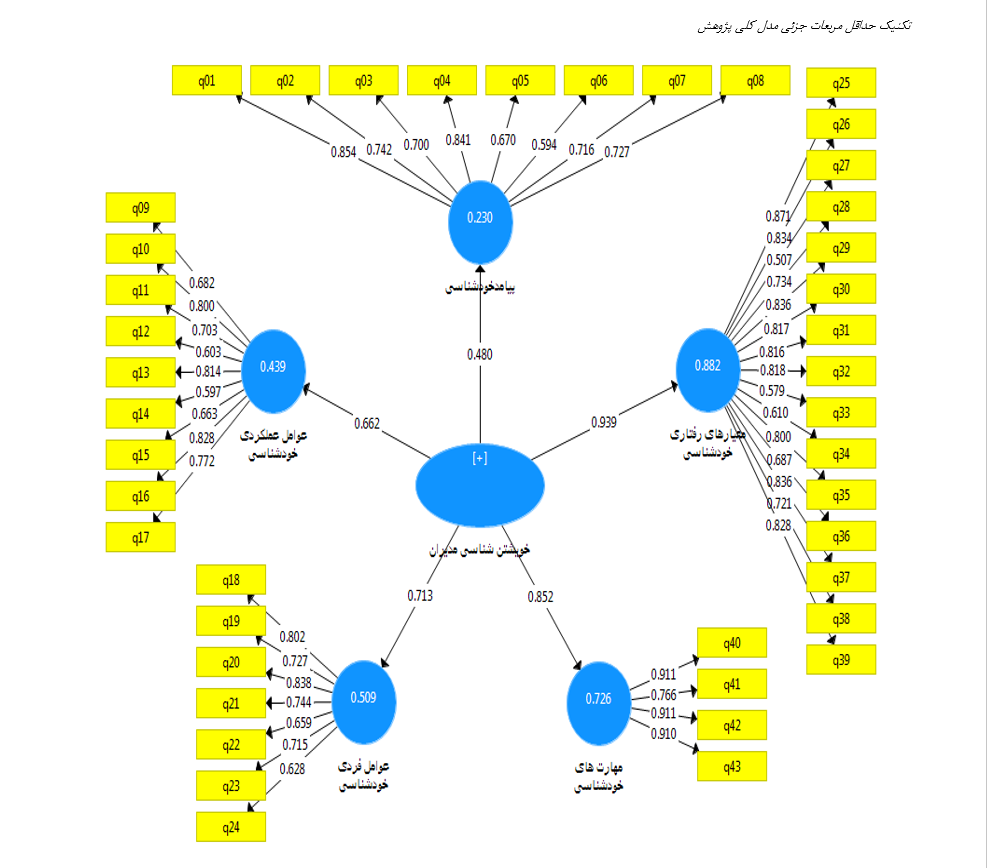اعتبارسنجی مدل خویشتن شناسی مدیران سازمانهای دولتی ایران
کلمات کلیدی:
خودشناسی, خویشتن شناسی مدیران, رفتار مدیرانچکیده
هدف این پژوهش، ارائه و اعتبارسنجی مدل خویشتنشناسی مدیران سازمانهای دولتی ایران است. این تحقیق به روش توصیفی-پیمایشی و با رویکرد ترکیبی (کیفی-کمی) انجام شده است. در بخش کیفی، مدل اولیه از طریق تحلیل مصاحبههای تخصصی با خبرگان حوزه مدیریت استخراج و تدوین شد. در بخش کمی، جامعه آماری شامل مدیران ارشد، میانی و عملیاتی سازمانهای دولتی ایران بود که با استفاده از روش نمونهگیری تصادفی طبقهبندیشده و بر اساس فرمول کوکران، 384 نفر بهعنوان نمونه انتخاب شدند. ابزار گردآوری دادهها، پرسشنامهای استاندارد بود که روایی و پایایی آن ارزیابی شد. تحلیل دادهها با استفاده از نرمافزار Smart PLS صورت گرفت. نتایج نشان داد که عوامل عملکردی، فردی، و رفتاری خویشتنشناسی، همراه با مهارتها و پیامدهای آن، بهطور معناداری بر خویشتنشناسی مدیران تأثیرگذار هستند. یافتههای این تحقیق میتواند به مدیران و سازمانها در ارتقای مهارتهای مدیریتی و افزایش اثربخشی عملکرد سازمانی کمک شایانی کند.
دانلودها
مراجع
Carden, J., Jones, R. J., & Passmore, J. (2022). Defining Self-Awareness in the Context of Adult Development: A Systematic Literature Review. Journal of Management Education, 46(1), 140-177. https://doi.org/10.1177/1052562921990065
Dummel, S., & Stahl, J. (2019). Mindfulness and the Evaluative Organization of Self-Knowledge. Mindfulness, 10, 352-365. https://doi.org/10.1007/s12671-018-0980-6
Hamidi, A., Faghihi, A., & Teimoornezhad, K. (2024). Identifying and Ranking Factors Affecting Policymaking of Public Administrators' Education. Public Management Researches, 16(62), 63-96. https://doi.org/10.22111/jmr.2022.42740.5807
Lawrence, E., Dunn, M. W., & Weisfeld-Spolter, S. (2018). Developing leadership potential in graduate students with assessment, self-awareness, reflection and coaching. Journal of Management Development, 37(8), 634-651. https://doi.org/10.1108/JMD-11-2017-0390
McConnell, A. R., Dunn, E. W., Austin, S. N., & Rawn, C. D. (2011). Blind spots in the search for happiness: Implicit attitudes and nonverbal leakage predict affective forecasting errors. Journal of Experimental Social Psychology, 47, 628-634. https://doi.org/10.1016/j.jesp.2010.12.018
Morin, A. (2006). Levels of consciousness and self-awareness: A comparison and integration of various neurocognitive views. Consciousness and Cognition, 15(2), 358-371. https://doi.org/10.1016/j.concog.2005.09.006
Neumann, O., Guirguis, K., & Steiner, R. (2024). Exploring artificial intelligence adoption in public organizations: a comparative case study. Public Management Review, 26(1), 114-141. https://doi.org/10.1080/14719037.2022.2048685
Oliinyk, M. (2024). Digital Transformation of Management Processes in State and Public Organizations: Features, Directions, and Recommendations for Development. Management and Entrepreneurship Trends of Development, 1(27), 53-63. https://doi.org/10.26661/2522-1566/2024-1/27-05
Segal, L., & Lehrer, M. (2012). The Institutionalization of Stewardship: theory, propositions, and Insights from Change in the Edmonton Public Schools. Organization Studies, 33(2), 169-201. https://doi.org/10.1177/0170840611433994
Showers, C. J. (1992). Compartmentalization of positive and negative self-knowledge: Keeping bad apples out of the bunch. Journal of personality and social psychology, 62(6), 1036-1040. https://doi.org/10.1037/0022-3514.62.6.1036
Showers, C. J., Abramson, L. Y., & Hogan, M. E. (1998). The dynamic self: How the content and structure of the self-concept change with mood. Journal of personality and social psychology, 75(2), 478-493. https://doi.org/10.1037/0022-3514.75.2.478
Showers, C. J., Ditzfeld, C. P., & Zeigler-Hill, V. (2015). Self-concept structure and the quality of self-knowledge. Journal of personality, 83(5), 535-551. https://doi.org/10.1111/jopy.12130
Showers, C. J., & Kling, K. C. (1996). Organization of self-knowledge: Implications for recovery from sad mood. Journal of personality and social psychology, 70(3), 578-590. https://doi.org/10.1037/0022-3514.70.3.578
Sutton, A. (2016). Measuring the effects of self-awareness: Construction of the Self-Awareness Outcomes Questionnaire. Europe's journal of psychology, 12(4), 645-658. https://doi.org/10.5964/ejop.v12i4.1178
Valle, M. (1999). Crisis, Culture and Charisma: The New Leader's Work in Public Organizations. Public Personnel Management, 28(2), 245-257. https://doi.org/10.1177/009102609902800206

دانلود
چاپ شده
ارسال
بازنگری
پذیرش
شماره
نوع مقاله
مجوز
حق نشر 2025 Amid Deilami Moezzi (Author); Mehran Mokhtari Bayekolaei; Davood Kia Kojouri (Author)

این پروژه تحت مجوز بین المللی Creative Commons Attribution-NonCommercial 4.0 می باشد.











